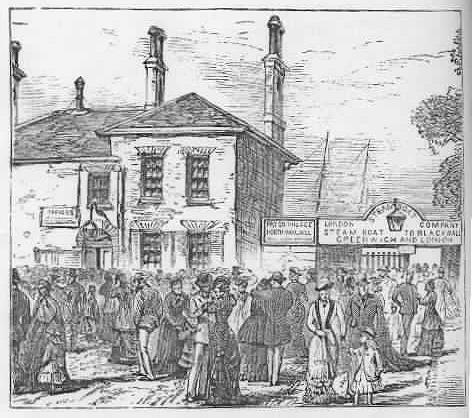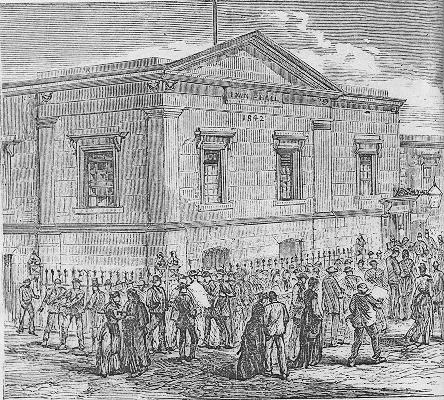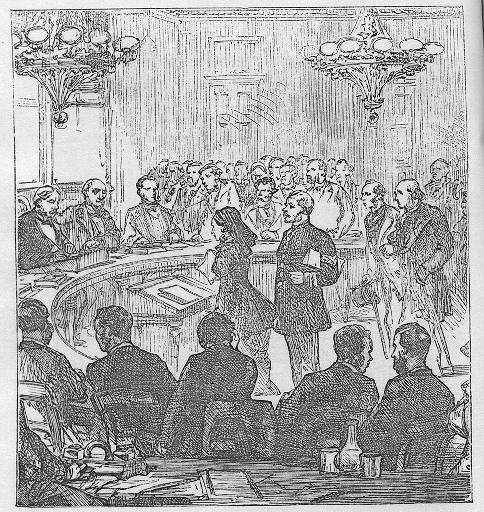
Collision between the "Bywell Castle" and the "Princess
Alice," Sept. 3 1878.
The Greatest Affliction of the Age.—No calamity which has afflicted the generation to which we belong can compare with the loss of the " Princess Alice " pleasure steamboat, and the six hundred lives sacrificed at the close of a summer-like day in the autumn of 1878 The fearful suddenness of the catastrophe and the social condition of many of the victims, the awful proportions of the death-roll, and the new peril which seemed to come home to all the thousands who were wont to travel by water—all contributed to the horror of an event which shook Great Britain like an earthquake, and sent a shudder vibrating through the world.
When the Furies planned this dire misfortune why should they have laid the scene at Woolwich? Were we not sufficiently notorious for deeds of evil—murders, explosions, fires, floods, fogs, wrecks, and riots, not to speak of a reputation founded and established on the fiendish trade of war? Most of our visitations we could have accepted as natural consequences of a risky profession and unholy commerce, but there was nothing in the nature of Woolwich any more than in any other part of the river Thames, and no special predominance even in sin over many other large towns, to justify the sorrow and stain cast upon it by the most overwhelming calamity the nation has seen in all the years which we call our time.
Looking back through the seasons that have since passed we recall rebellious murmurs such as these, amid the toil and suffering of that great trial, and there scorns still a strange fatality about it which we can only set down to the unsatisfactory explanation, which has often had to answer for a better reason, that "Woolwich is always remarkable for remarkable things."

Collision between the "Bywell Castle" and the "Princess
Alice," Sept. 3 1878.
The "Princess Alice" Sunk.— Tuesday, the 3rd day of September, 1878, had been sultry, and the evening was warm and "muggy." Weary with a troublesome days work I was preparing for an early rest when a message came that there had been a collision on the river, and that a big steamer had gone down with an untold freight of precious lives. Casting off fatigue with my slippers, I made all haste to reach Roff's Pier, enquiring of such acquaintances as I chanced to meet, a few of whom had heard "something" of a wreck on the river, others who had I heard nothing, and laughed at the "old woman's tale." Too soon the matchless horror was revealed.
On the wharf and pier a small crowd had collected, not more than fifty as yet, and among them were several well—known townsmen who, from that moment to the end of the long and heavy strain, devoted themselves day and night without pause, without thanks, and without reward, to do all that was in the power of humanity, if not to lessen the evil, at least to fulfil its sacred obligations, to bear a share of it burdens, and to bring lasting honour and renown for its humanity and public spirit upon the town of Woolwich.

The crowd at the Steamboat Offices, Roff's Pier.
Ghastly Sights.—Soon policemen and watermen were seen by the feeble light bearing ghastly objects into the offices of the Steampacket Company, for a boat had just arrived with the first consignment of the dead, mostly little children whose light bodies and ample drapery had kept them afloat even while they were smothered in the festering Thames. I followed into the steamboat office, marvelling at the fate which had brought the earliest harvest of victims to the headquarters of the doomed ship, and, entering the board-room, the first of the martyrs was pointed out to me as one of the company's own servants, a man employed on the "Princess Alice," and brought here thus soon to attest by his silent presence the ships identity. The lifeless frames of men and women lay about, and out on the balcony, from which the directors had so often looked upon their fleet through the fragrant smoke of the evening cigar, there was a sight to wring out tears of blood from the eyes of any beholder. A row of little innocents, plump and pretty, well-dressed children, all dead and cold, some with life's ruddy tinge still in their cheeks and lips, the lips from which the merry prattle had gone for ever.
Lovely in death the beauteous ruins lay;
Far lovelier! Pity swells the tide of love.
Callous as one may grow from frequent contact with terrors and afflictions, one could never be inured to this. It was a spectacle to move the most hardened official and dwell for ever in his dreams. Then to think what was beyond out there in the river. It was madness!
On horror's head horrors accumulate.
But somebody must collect the facts together and tell the affrighted
universe the desolation. The task was mine.
Telling the Dread News.—It was near midnight
when I reached the post office with my budget of adversity. I had previously
warned the telegraph clerks, as agents of the press are privileged to do,
and they were ready.
The following is the story (somewhat shortened)
which at morning light was told in more than three thousand newspapers,
to the people of every civilized land throughout the earth

At the Town Hall
The Newspapers. —The forgoing statement represents the first impressions derived from such hasty and excited narratives as a reporter could gather among the wailing and turmoil, and it is to the credit of my informants that there was very little written down which 1 have since wished to amend.
Yet the first bringer of unwelcome news
Hath but a losing office; and his tongue
Sounds ever after as a sullen bell
Remembered knolling a departed friend.
The loss of life was nearly six hundred instead of five hundred as conjectured, conjectured without any certain evidence of the number on board, and I was told that the Alice was struck on the starboard, not the port side, but there was little else to correct, little else to reveal. The gloom and misery and despair of the next day and the days which followed, who can describe? The newspapers of course were full of minute details on every possible phase of the frightful theme. Some of the editors had been telegraphing to me all through the wretched night to "keep on wiring," and the first train down in the morning brought an army of reporters. One "daily" alone had nine special correspondents at work in Woolwich for the best part of a week, so eager was the public appetite to feed upon the caviare news.
Seekers for the Dead.—Crowds of others beside the pressmen also flocked hither, mostly mere curiosity-seekers, but among them anxious and agonized friends vainly seeking those whom they had lost. It was more dreadful to see these survivors than to look upon the dead. In the next fortnight we were familiar with the sight of strangers, generally in couples, walking with dazed and melancholy aspect through streets, waiting for their dead to be brought on shore; and every day we saw the same sad faces as they passed down the dread array of corpses in the Dockyard, looked for the loved ones, who would see them never more on earth.
The Funerals.—It was fortunate that there was a large place like the Dockyard available to meet the emergency, and the authorities not only granted its use, but sent down large parties of soldiers to render help. As soon as a body was identified it was coffined and promptly buried, and long processions of army waggons bearing the dead to the cemetery were seen day after day. One of the latest of the bodies recovered was that of Mr. Frederick Whomes, the talented organist of the Dockyard Church, who, being a well-known Woolwich man, was followed to the grave by thousands of the townspeople.

The Inquest
The Inquest.—The inquest was held in the Board room at the Town hail, before Mr. C. J. Carttar, coroner, and occupied more than thirty days. The identification evidence alone took up much time, and was of a very melancholy character. Most of the witnesses were persons well-to-do in life, and many of them told one after another of whole families lost, with here and there a husband and father left mourning alone, his household robbed of all the rest—
All, all the pretty chickens and their dam
At one fell swoop.
Diverse Verdicts.—At the end Mr. C. J. Carttar made a long and lucid summing up, and the magnitude of the disaster affected even the deliberations of the jury, who sat from seven at night until five in the morning before they could agree upon a verdict. I have a sheet of foolscap on which the scribe of the jury drafted a dozen or more verdicts before his terms could satisfy even a majority, but it concludes with the decision which fifteen out of the nineteen jurors consented at last to sign, and this was a verdict against the Princess Alice. However, another jury at Millwall had also gone into the facts and found that the blame was due to the Bywell Castle, and, four days prior to the Woolwich verdict, a legal opinion had been given in the Admiralty Court against both the Princess Alice and the Bywell Castle, so that the net result was of very questionable value.

Scene of the Wreck of the "Princess Alice" (from the
North)
The Number of Dead. —The Princess Alice Memorial in Woolwich cemetery was erected by a sixpenny subscription throughout the kingdom. The inscription states with sufficient accuracy that the victims numbered 550. As nearly as I have been able to ascertain, and I have endeavoured to make this record precise, there were 544 inquests at Woolwich, and 46 elsewhere, making the total 590. Some of the dead may have been washed out to sea and never recovered, but this is not probable. Woolwich spent £1,380 in recovering and burying the dead, and the county justices, who had always previously paid such expenses, repudiated the charge and escaped by a quibble.’ The Treasury voted £100 towards the bill, and the ratepayers paid the rest.
Memorial Cross.—The memorial just mentioned consists of a handsome ornamental marble cross of the Irish order, and the base has an inscription which says
"It was computed that seven hundred men, women, and children were on board. Of these about five hundred and fifty were drowned. One hundred and twenty were buried near this place."
"Erected by a national sixpenny subscription, to which more than twenty-three thousand persons contributed."
Captain Grinstead.—Quite adjacent is the grave of the captain of the Princess Alice and his relatives who were drowned on the same fatal occasion
William R. H Grinstead, aged 47; John J. Grinstead, 14 ; Charles T. Grinstead, .56 ; and Jane Grinstead, 53.
A cane has come to light which seems to
be a memorial to 'The Princess Alice'
Does anyone have any information on such
a cane
Follow this link for more details
Princess Alice links
http://www.alsbury.co.uk/princessalice/
http://www.lostliners.com/Princess_Alice/
This page was designed and is maintained
by Toby and John King, I would accept any comments or questions See
Index Page